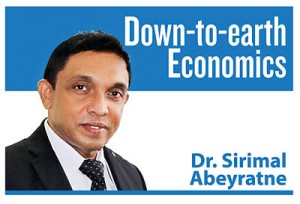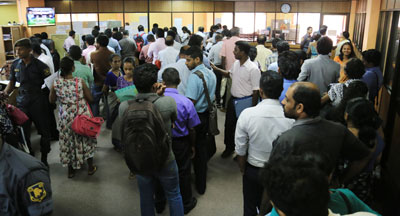Memorandum of misunderstanding
View(s):Universities in Sri Lanka have the practice of entering into Memorandum of Understanding (MOU) with foreign universities to carry out various collaborative educational and research programmes for both students and staff members. A few weeks ago, I came to know that they are no longer able to sign such MOUs with foreign universities without the approval of the government; here the “government” means, as I learnt, the Ministry of Foreign Affairs through the Ministry of Higher Education and the University Grants Commission.
Anyway, it is not my intention to examine and evaluate the above. Rather it directs me to examine a much bigger national issue which affects our economy and prosperity.
My intention is to remain within my subject area and to talk about the “Ease of doing business” or, looking at it from the opposite angle, the “Difficulty of doing business.” In some countries, doing things are easier so that they grow fast and become rich. In some other countries, doing things are difficult so that they grow slow and continue to remain poor.
The countries which have understood the difference between the two sides are executing reforms that are leading to a system that makes “things easier” in order to support their growth.
It is the bureaucratic system of a country that determines how easy it is or how difficult it is to do businesses there. Therefore, bureaucracy is an important determinant of the speed of growth.
Bureaucracy
Bureaucracy is the government’s administrative system. It is run by all types of public sector institutions operating from national to local levels. Citizens of the country and their organisations and companies, they all have to deal with the bureaucracy in conducting their personal and professional affairs.
In some countries, the bureaucratic procedures are “short and simple” so that people can get things done quickly. The governments which have understood the importance of this undertake public sector reforms in order to make their bureaucratic procedures short and simple.
In contrast, some other countries have got “lengthy and complicated” bureaucratic procedures. They even move in the reverse direction, by multiplying bureaucratic procedures. There is a saying that “bureaucracy multiplies bureaucracy.” This means that the lengthy and complicated bureaucratic system has the capacity to extend its length even more and complicate its complexity even more.
Number of signatures
How do we assess the bureaucratic procedures we are dealing with? It is not difficult; if you are going to get something done with the government you can identify the length and complexity of the procedures that you have to follow. What you need to get done from the government requires a document on a paper, if not a bundle of papers.
The “number of signatures” that your document requires is an indicator of the lengthy bureaucratic procedures. This means that at each point of getting signatures, somebody has to read the document and make an assessment of the content. It means that your document has already created many employment opportunities too.
For this reason, the government should hire too many people to the public sector. Your document not only creates jobs, but also demand for wages, salaries, overtime payments, allowances and other perks as well.
Losing the competitiveness
Your document will demand for fixed assets too. There should be office buildings to accommodate bureaucratic procedures and employees who carry out such procedures. The office complexes should come with office furniture, equipment, apparatuses, vehicles and other items.
That’s why bureaucracy can multiply the size of the government and the government employment wage bill. In fact the governments like it too; through that, many people who follow the politicians can be given government jobs and other contracts, asking the people to pay more taxes to accommodate “lengthy and complicated” bureaucratic procedures.

A 2015 file picture of the Registrar of Companies office. Since then systems have been streamlined with an online applying process.
When you capture the cost of all of the above, economists call it the transaction cost. It is a cost that is ultimately added to the price of any good or a service that the country produces. The excessive transaction costs eat into the country’s international competitiveness.
One subject, many signatories
If your document has to travel, not among many office rooms, but also among many different offices, places and locations, then getting the required number of signatures becomes even more complicated. The number of signatures are to be placed at different offices located far from each other, somebody has to take the documents there – that’s another job opportunity.
When you have got too many ministries and the government agencies coming under different ministries, then imagine the outlook of the complications that you need to deal with.
Your document can also return back to you halfway through its journey along the bureaucratic procedures for some clarifications and questions! There will be too many “minutes” placed on your document, and the number of minutes is an indicator of the lengthy and complicated bureaucratic procedures. Then you need to start the process again.
Sometimes it is not unusual that the subject content of your document or its meaning and gravity is totally unknown to some signatories of the bureaucratic procedures. This is simply a good enough reason for your document to return to you for clarifications and answers for the questions. Therefore, you also need to find ways and means of convincing the gravity of your document.
Diluted accountability
Once I asked a friend of mine who recently started serving in a bureaucratic set up: “Why does it require so many approvals and signatures?” He answered: “There should be a responsibility; if something goes wrong who is going to be responsible?”
The underlying meaning of his answer was that, “if you have got it approved by many signatories, actually no one has to be accountable at the end.” If no one has the direct responsibility, they don’t have to be accountable either because the accountability gets diluted.
In a lengthy and complicated bureaucratic arrangement, it is easy to find reasons and arguments for “why it cannot be done.” According to Harry Teasley’s first rule out of the Seven Rules of Bureaucracy is about this: Maintain the problem at all costs because it is the foundation of power, perks, privileges, and security.
Ease of doing business
The World Bank calculates a composite index every year to show “how easy it is to do businesses” in different countries and, rank them accordingly. The index captures mostly the bureaucratic procedures and underlying regulations in 10 different areas affecting the business environment:
1. Starting a business, 2. Dealing with licences, 3. Employing workers, 4. Registering property, 5. Getting credit, 6. Protecting investors, 7. Paying taxes, 8. Trading across borders, 9. Enforcing contracts and 10. Closing a business.
Out of 190 countries in the world, being in the 111th position in 2018, Sri Lanka is not even among the first half of the countries. It is interesting and shocking to observe that Sri Lanka’s position was better in the past than it is today; in 2012, it was in the 81st position out of 185 countries.
Good question
Who wants to improve the “Ease of doing things” in Sri Lanka? If anyone considers it, then it requires a comprehensive reform in the overall public sector. The years 1977 and 1989 were marked by major policy reforms in Sri Lanka; yet even on these occasions the public sector reforms did not receive much attention.
By the way, during the past 10 years, I have come across a few attempts to improve Sri Lanka’s position of the “Ease of Doing Business” index. It was in the midst of those attempts that we saw a further deterioration of Sri Lanka’s position of the “Ease of doing things.”
(The writer is a Professor of Economics at the Colombo University. He can be reached at sirimal@econ.cmb.ac.lk)


